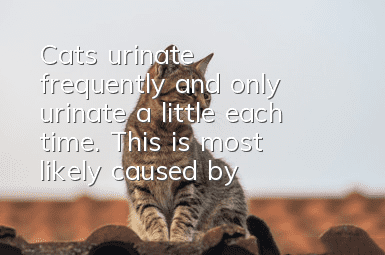Cats urinate frequently and only urinate a little each time. This is most likely caused by urinary stones.

Cats who urinate frequently and only urinate a little each time are mostly urinary stones, which are usually accompanied by symptoms such as difficulty urinating, painful urination, lack of energy, frequent licking of the urethral opening, and even blood in the urine. The cat should be taken to a doctor immediately for treatment, as urinary stones may be delayed. It can cause the cat to urinate or even die.
Frequent urination in cats may be urinary stones
Cat urinary stones are a high-risk disease in cats. The formation of stones is because most cats do not like to drink water and do not exercise enough. This can easily cause the concentration of crystalline salts in the urine to be too high, precipitate and accumulate, leading to the formation of stones. The solid material gets larger and larger, blocking the urethra.
Symptoms of urinary stones in cats
1. Frequent urination, but little or no urination each time.
2. If you have difficulty urinating, it is very likely that the urethral stone has severely blocked the urinary tract.
3. Pain during urination.
4. Traces of blood in urine.
5. Poor mental appetite.
6. Likes to lick the urethral opening.
7. Suddenly like to urinate randomly and have abnormal changes in habits.
Causes of urinary stones in cats
The formation of stones is relatively slow because the precipitation and growth of mineral crystals in urine is a slow process.
1. Inadequate water intake
The direct cause of stones is that the urine concentration is too high. This is something we learned in junior high school chemistry. When the concentration of the solution is saturated, other substances can no longer be dissolved in the solution and can only crystallize into a solid form.
Generally speaking, cats are not very fond of drinking water, so they are more likely to develop stone problems.
2. Excessive mineral intake
The large amount of minerals in urine is the direct cause of stones. Compared with urine, there is a trade-off relationship. Under the premise of a certain mineral intake, less water intake will lead to less urine, and minerals will be less. The ratio will increase.
On the contrary, if the water intake (urine output) is determined, if the mineral intake is small, the urine concentration will be low, and conversely, the more the intake, the higher the concentration will be. Exceeding the solubility limit (saturation) of urine will naturally cause crystallization to form stones.
3. Bacterial infection
Part of the cause of stones is caused by bacteria. Infection causes bacteria to multiply in large numbers. Bacteria and their products can easily act as crystal nuclei and become the core and attachment point for stone growth.
4. Little exercise
But if the amount of exercise is low, stones/crystals tend to adhere to the inner wall of the urinary system and cannot be excreted on their own (when they are young).
If you maintain a good amount of exercise, the stones/crystals originally attached to the inner wall of the urinary system can fall off and become free, so that they can be excreted from the body with urine before they grow up. It will not continue to grow to the extent that it affects health.
In addition, there may be other factors, such as innate constitution, physiological structure (male cats are naturally more susceptible to the disease than female cats), emotional influence (stress response), holding in urine and other factors.
It is recommended to take the cat to the hospital for treatment in time to avoid delays in the condition that may lead to deterioration or even endanger the cat's life.
- What effect does Moutian Polygonum have on cats? Is it harmful to cats?
- The quickest solution to a bloated cat’s belly
- Why doesn’t the cat’s fur grow even after being shaved for half a year?
- Catnip planting season
- If you knew these shortcomings of a Ragdoll cat, would you still be willing to keep it?
- What should pregnant cats eat? Can female cats use milk powder to supplement their nutrition when pregnant?
- What is the best food for American wirehair cats?
- Which color is better for Isle of Man tailless cats?
- Do Munchkin cats have genetic defects?
- If your cat at home encounters the following problems, do you know what to do?



